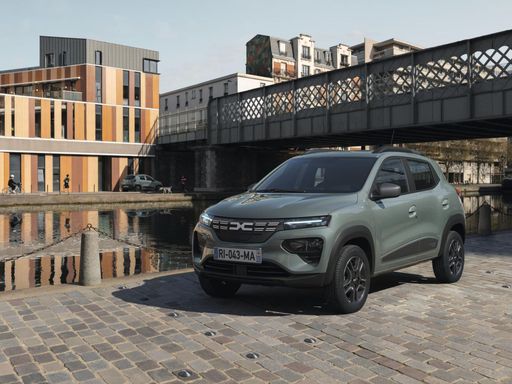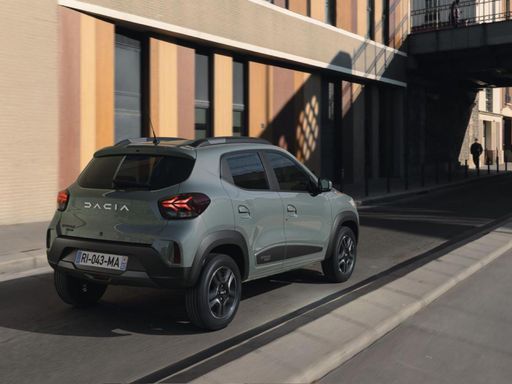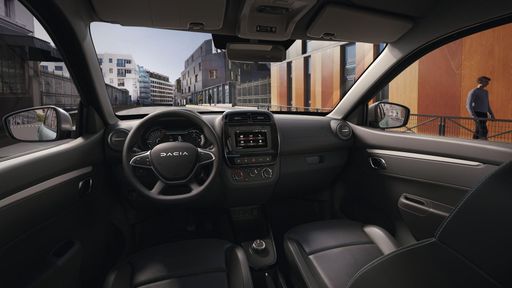Dacia Spring VS Peugeot 208
Dacia Spring
The Dacia Spring stands out as an affordable and environmentally friendly option in the electric vehicle market, combining practicality with a compact design ideal for urban settings. Its minimalist interior, while basic, provides all the essential features needed for a comfortable drive, reflecting its cost-effective approach. The vehicle's performance suits city driving, making it an appealing choice for those seeking an entry-level electric car.
more informationPeugeot 208
The Peugeot 208 exudes a distinctive French charm, combining sleek lines with an assertive stance on the road. Inside, it offers a modern and sophisticated cabin, complete with intuitive technology and high-quality finishes to enhance the driving experience. Its agile handling and efficient performance make it a delightful choice for both city commuting and longer journeys.
more information @ dacia-presse.de
@ dacia-presse.de
 @ dacia-presse.de
@ dacia-presse.de
 @ dacia-presse.de
@ dacia-presse.de
 @ www.media.stellantis.com
@ www.media.stellantis.com
 @ www.media.stellantis.com
@ www.media.stellantis.com
 @ www.media.stellantis.com
@ www.media.stellantis.com
 @ www.media.stellantis.com
@ www.media.stellantis.com
Costs and Consumption |
|
|---|---|
|
Price
about 15600 - 18400
$
|
Price
about 21200 - 37700
$
|
|
Consumption L/100km
-
|
Consumption L/100km
4.7 - 5.4
L
|
|
Consumption kWh/100km
13.2 - 14.1
kWh
|
Consumption kWh/100km
14 - 16.1
kWh
|
|
Electric Range
225 - 228
km
|
Electric Range
363 - 410
km
|
|
Battery Capacity
26.8
kWh
|
Battery Capacity
46 - 51
kWh
|
|
co2
0
g/km
|
co2
105, 106, 121, 0
g/km
|
|
Fuel tank capacity
-
|
Fuel tank capacity
44
L
|
Dimensions and Body |
|
|
Body Type
SUV
|
Body Type
Hatchback
|
|
Seats
4
|
Seats
5
|
|
Doors
5
|
Doors
5
|
|
Curb weight
1030 - 1050
kg
|
Curb weight
1165 - 1530
kg
|
|
Trunk capacity
308
L
|
Trunk capacity
265 - 309
L
|
|
Length
3701
mm
|
Length
4055
mm
|
|
Width
1583
mm
|
Width
1745
mm
|
|
Height
1519
mm
|
Height
1430
mm
|
|
Payload
265 - 285
kg
|
Payload
380 - 430
kg
|
Engine and Performance |
|
|
Engine Type
Electric
|
Engine Type
Petrol MHEV, Petrol, Electric
|
|
Transmission
Automatic
|
Transmission
Automatic, Manuel
|
|
Transmission Detail
Reduction Gearbox
|
Transmission Detail
Automat. Schaltgetriebe (Doppelkupplung), Manual Gearbox, Reduction Gearbox
|
|
Drive Type
Front-Wheel Drive
|
Drive Type
Front-Wheel Drive
|
|
Power HP
44 - 65
HP
|
Power HP
101 - 156
HP
|
|
Acceleration 0-100km/h
13.7 - 19.1
s
|
Acceleration 0-100km/h
8.3 - 10.9
s
|
|
Max Speed
125
km/h
|
Max Speed
150 - 200
km/h
|
|
Torque
113 - 125
Nm
|
Torque
205 - 270
Nm
|
|
Number of Cylinders
-
|
Number of Cylinders
3
|
|
Power kW
33 - 48
kW
|
Power kW
74 - 115
kW
|
|
Engine capacity
-
|
Engine capacity
1199
cm3
|
|
Top speed
125
km/h
|
Top speed
150 - 200
km/h
|
General |
|
|
Model Year
2024
|
Model Year
2023 - 2024
|
|
CO2 Efficiency Class
A
|
CO2 Efficiency Class
C, D, A
|
|
Brand
Dacia
|
Brand
Peugeot
|
Dacia Spring
The Revolution of Affordable Electric Mobility: The Dacia Spring
The automotive world has witnessed remarkable advancements in electric vehicles (EVs), with the Dacia Spring emerging as a noteworthy contender in the affordable segment. Combining efficiency, affordability, and practicality, the Spring offers an intriguing prospect for eco-conscious individuals and city dwellers alike.
Powertrain and Performance: A Look Under the Hood
The Dacia Spring is equipped with an electric motor that delivers between 44 to 65 PS, translating into a versatile driving experience tailored to urban landscapes. It operates on a front-wheel-drive system, ensuring a familiar and manageable handling experience.
Dacia Spring's electric engine is paired with an automatic transmission, utilising a reduction gearbox. This setup allows for smooth acceleration and a top speed of 125 km/h, ensuring that everyday driving scenarios are handled with ease.
Efficiency and Range: Eco-Friendly without Compromise
Efficiency is a cornerstone of the Dacia Spring's design, boasting an energy consumption of just 13.2 to 14.1 kWh per 100 km. When fully charged, its 26.8 kWh battery offers a respectable range of 225 to 228 km, making it ideal for daily commutes and short trips.
Furthermore, the Spring takes pride in its commendable CO2-efficiency class A, emphasising its commitment to reducing environmental footprint with a zero-emission profile.
Design and Practicality: Compact yet Comprehensive
Lying in the SUV category, the Dacia Spring is compact with dimensions of 3701 mm in length and 1583 mm in width, making it a perfect match for urban environments where space is at a premium. Despite its modest size, it provides a generous boot space of 308 litres, ensuring practicality isn’t sacrificed.
Comfort and Interior: For the Everyday Journey
The Dacia Spring comfortably seats up to four passengers. The cabin offers a minimalist yet functional design, available in multiple trim lines including Essential, Expression, and Extreme, allowing customers to choose according to their taste and requirement.
With its ergonomic layout and simplicity, the interior is crafted to enhance the driving experience by focusing on essential needs, avoiding unnecessary distractions.
Affordability and Accessibility: Breaking Barrier
The Dacia Spring stands out in the electric vehicle market due to its affordability, with prices ranging from 16,900 to 19,900 €. This ensures that environmentally friendly transportation is accessible to a broader audience.
Additionally, the Spring allows for cost-effective maintenance and operational expenses, offering monthly running costs between 570 to 599 € and cost per km between 22.8 to 24 cents, making it an economical choice in the long run.
Final Thoughts: The Future of Urban Mobility
In summary, the Dacia Spring serves as a testament to how electric vehicles can be both affordable and practical, without compromising on essential features. Whether it is for the eco-conscious urbanite or those looking for a cost-effective daily driver, the Spring is positioned as a viable solution for navigating the future of urban mobility.
Peugeot 208
A Glimpse into the Future: The New Peugeot 208
The Peugeot 208, with its sleek design and innovative features, continues to set benchmarks in the automotive industry. As a hatchback, it seamlessly blends style with practicality, offering the perfect solution for urban driving and long-distance travels alike. In this article, we delve into the technical details and innovations that distinguish the latest iterations of the Peugeot 208.
Engine Options: Efficiency Meets Performance
The Peugeot 208 provides an array of engine options catering to different driving preferences. Featuring both petrol Mild-Hybrid technology and full electric powertrains, it offers a versatile range designed to accommodate eco-conscious drivers as well as those who prioritise performance.
With power outputs ranging from 101 PS to 156 PS, and a torque span of 205 Nm to 270 Nm, these machines are meticulously engineered to provide thrilling yet efficient drives. The petrol versions utilise a three-cylinder 1199 cm³ engine, optimising fuel consumption between 4.7 and 5.4 L/100km, while the electric e-208 models boast an impressive range of up to 410 km on a single charge.
Advanced Transmission Systems
The Peugeot 208 models come equipped with an advanced automatic transmission system, employing either a dual-clutch automatic gearbox or a manual transmission, depending on the chosen variant. These systems guarantee smooth gear transitions, thus enhancing driving pleasure and overall efficiency.
Performance and Environmental Considerations
From a performance standpoint, the Peugeot 208 impresses with its ability to accelerate from 0 to 100 km/h in between 8.3 to 10.9 seconds, depending on the model chosen. This level of performance is complemented by a top speed ranging from 150 to 200 km/h, ensuring that the 208 is more than capable of holding its own on the motorway.
With environmental consciousness at the forefront, the vehicle's CO2 efficiency class ranges from A to D, further establishing the Peugeot 208 as a responsible option for modern drivers keen on reducing their carbon footprint.
Comfort and Practicality: A Class Act
The interior of the Peugeot 208 reflects its exterior's stylish flair. It comfortably seats five passengers and offers a boot capacity of 265 to 309 litres, accommodating both city commutes and weekend getaways. Advanced comfort features and a state-of-the-art infotainment system ensure that rides are as enjoyable for passengers as they are for the driver.
Cost Considerations
The Peugeot 208 manages to strike a remarkable balance between cost efficiency and luxury. With prices ranging from €22,950 to €40,825, there is a variant to suit most budgets while still providing a premium experience. Additionally, the monthly costs and costs per kilometre are kept in check, making it an economically sound choice in the long term.
Dimensions and Design: Compact yet Spacious
Measuring 4,055 mm in length, 1,745 mm in width, and 1,430 mm in height, the Peugeot 208 maintains a compact profile that is perfectly suited to tight urban environments. Despite its manageable size, it offers ample space inside, thanks in part to clever design and engineering.
Conclusion: A Future-Proof Choice
The Peugeot 208 is a testament to modern automotive innovation. Whether powered by traditional engines or fully electric powertrains, it consistently delivers on performance, efficiency, and style. The combination of cutting-edge technology and sustainable practices places the Peugeot 208 as a forward-thinking choice for drivers seeking a vehicle that epitomises the best of contemporary motoring.
